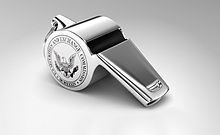 The legal definition of corporate fraud is when an individual or company conducts business dishonestly and in an illegal manner. The term white-collar crime describes offenses that are committed by using fraudulent schemes. The most common types are crimes involving embezzlement, forgery, theft, money laundering and insurance scams. These crimes are often difficult to prevent and catch because the perpetrators are often on the inside and considered to be a trusted individual. Even when evidence of fraud has been uncovered, prosecutors must be able to prove the following legal elements existed:
The legal definition of corporate fraud is when an individual or company conducts business dishonestly and in an illegal manner. The term white-collar crime describes offenses that are committed by using fraudulent schemes. The most common types are crimes involving embezzlement, forgery, theft, money laundering and insurance scams. These crimes are often difficult to prevent and catch because the perpetrators are often on the inside and considered to be a trusted individual. Even when evidence of fraud has been uncovered, prosecutors must be able to prove the following legal elements existed:
- An individual or company intentionally made a false statement of material fact
- The individual or company knew that the statement was untrue
- The individual or company intended to deceive the victim
- The individual or company knew the victim would rely on the statement
- The victim was financially injured as a result
Whenever the United States government becomes injured through fraud, the U.S. Department of Justice has jurisdiction over the matter. Fraudulent crimes can be prosecuted at both the state and federal levels. Here is some crucial information for whistleblowers.
Federal Bureau of Investigation (FBI)
The Federal Bureau of Investigation (FBI) is tasked with investigating all federal white-collar crimes. The Financial Crimes Section (FCS) of the FBI primarily focuses on financial crimes including the following:
- Corporate Fraud
- Embezzlement
- Forgery
- Healthcare Fraud
- Identity Theft
- Insurance Fraud
- Money Laundering
- Mortgage Fraud
The FCS is divided into four units, which include the Economic Crimes Unit, the Financial Institution Fraud Unit, the Asset/Forfeiture Money Laundering Unit and the Healthcare Fraud Unit. The mission of the FCS is to investigate and oversee allegations of financial fraud. In 2003, FBI Director Robert Mueller announced the inception of the Corporate Fraud Hotline, which provides the general public with an opportunity to report suspected corporate fraud. Anyone can call the toll-free hotline by dialing 1-888-622-0117 if they suspect possible corporate fraudulent activities. The hotline is manned Monday through Friday by FBI analysts between the hours of 9 am and 5 pm Eastern Standard Time.
Federal Trade Commission (FTC)
The Federal Trade Commission (FTC) handles fraud complaints dealing with irregular business practices. A telemarketing company that is running a scam can victimize anyone with a phone. These often include scams involving:
- Buying Club Memberships
- Charity and Fundraising Fraud
- Credit and Loan Offers
- Identity Theft
- Medical Discount Plans
- Sweepstakes and Lotteries
- Travel Scams
- Work-at-Home and Business Opportunities
Telemarketers are required by law to tell you that it is a sales call and what they are selling. They are prohibited from contacting you before 8 am or after 9 pm. If they call outside these hours, you should report them to the FTC immediately by filling out a complaint, which can be done at this website.
State Attorney General
In addition to reporting fraud to the appropriate federal agency, you should report the suspected crime to the Attorney General in your state. You can file a report directly at the attorney general’s website. In order to locate the attorney general’s information in your area, visit the National Association of Attorneys General (NAAG) website. The NAAG is made up of 56 state and territorial attorneys general who have jurisdiction for enforcing the law in all 50 states, the District of Columbia, Puerto Rico, the Northern Mariana Islands and U.S. territories, which include American Samoa, Guam and the U.S. Virgin Islands.
Department of Justice (DOJ)
The United States Department of Justice (DOJ) Fraud Section investigates and prosecutes white-collar crimes and their mission is to enforce the law and defend the interests of the United States government. The primary purpose of the DOJ is to prevent and control crime and prevent and ensure that the guilty are subject to a fair and just punishment. The False Claims Act was passed to prohibit people from submitting false claims to the United States government. The DOJ whistleblower program generally pays informants between 15 and 25 percent of the proceeds recovered from organizations who cheat the government. If you want to report corporate fraud, go to the website at this address
Internal Revenue Service (IRS)
When someone suspects that an organization is not complying with the federal tax laws, the Internal Revenue Service (IRS) recommends filing a report, which can be done by filling out Form 3949-A online at the IRS website or printing the form and mailing it to the IRS office in Fresno, CA 93888. You can also send a letter to the IRS, with the following information:
- The name and address of the company you are reporting
- The employer tax identification number
- A description of the alleged violation and how you obtained the information
- The estimated amount of unreported income
- Your name, address and phone number
In 2006, the IRS began cracking down on organizations that cheat the government. They introduced a new whistleblower program that allows informants to benefit. The IRS Whistleblower Office pays money to individuals who blow the whistle on companies who fail to pay taxes they owe. When the IRS uses information provided by the whistleblower, that person is entitled to receive between 15 to 30 percent of the taxes, penalties and interest it collects. You can fill out Form 211, The Application for Ward for Original Information if you wish to receive a Whistleblower Informant Award.
This article was written by Sadaka Associates, Whistleblower Lawsuit Attorneys in New York and New Jersey. If you believe you have a case, call 1-800-810-3457 or contact us now.


